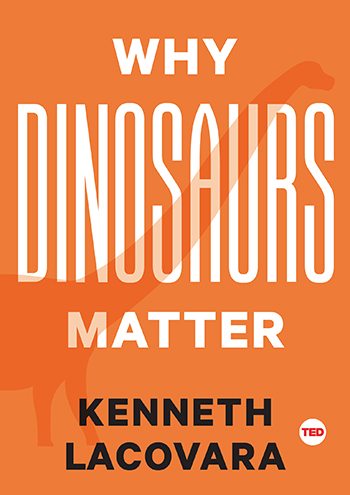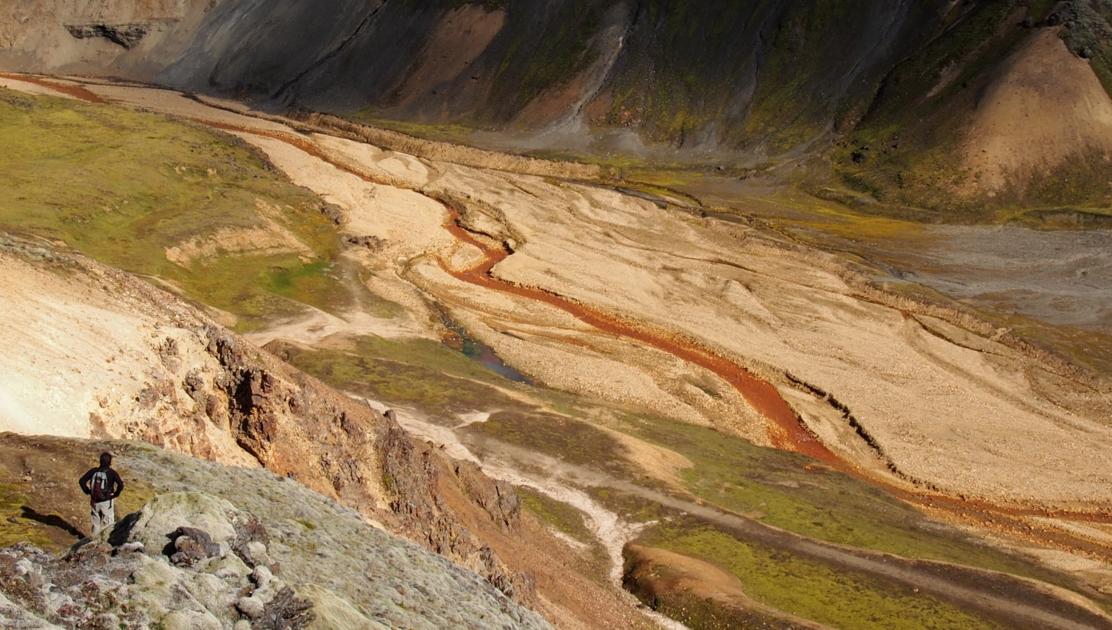Be Here Now… And in Deep Time
An Interview with Kenneth Lacovara
By Sam MoweAccording to paleontologist Kenneth Lacovara, we can learn a lot about what it means to be human today by looking back to when dinosaurs ruled the Earth. In his first book, Why Dinosaurs Matter, he makes the case that geological literacy and an understanding of deep time can help us consider “the multiple, simultaneous existential crises facing humanity.”
Lacovara recently spoke with the Garrison Institute about why it’s so hard for humans to comprehend deep time, how technology has caused us to detach from nature, and how looking to the deep past can help us make decisions for the future.
What is deep time?
Deep time refers to spans of time that stretch beyond the human experience, spans that exceed the written record and even the archeological record.
Why is understanding deep time so difficult for humans?
Until quite recently, humans were not aware of vast spans of time. Prior to the early 19th century, the most learned scholars in Europe believed the Earth to be no more than about 6,000 years old. Days, months, years, and decades can be reckoned with in the course of a human lifetime. And events spanning centuries and even millennia are knowable from written histories, legends, and artifacts. But the existence of deep time is not apparent in our everyday world. It’s not obvious that the rocks on which we tread are millions of years old. And the realization that fossils are ancient and of biogenic origin was slow to dawn on humanity.

Like all animals, we humans are finely tuned, exquisitely adapted organisms. But we evolved to live in the now. And it’s in the now that our attention to food, threats, and mates determines our evolutionary success. The slow-motion workings of the world are all but invisible to our unaided perceptions. When the progenitor of geology, James Hutton, authored the phrase, “the Earth reveals no vestige of a beginning, no prospect of an end,” he gave us deep time. In doing so, he created the thought space that became the canvas of Darwin and of every naturalist to follow.
In my experience, modern technology is characterized by speed and short-term thinking. Do you think our ability to contemplate deep time has been negatively influenced by technology?
I think, in many cases, technology has caused us to detach from nature. There’s an old joke in geology: “he or she who sees the most rocks wins.” But, if you don’t look away from your screen, you can’t see the rocks. Last week, I sat on the edge of the canyon of the Colorado River and stared at two billion years of Earth history recorded in its layers. Moments like that forge a personal connection to the Earth’s deep past, but they also impart a feeling of smallness. It’s humbling, and it makes me feel lucky to be alive, lucky to be human, and lucky to be me. And, as I write in Why Dinosaurs Matter, being lucky is a great feeling, but it should lead, I think, to gratitude, not pride. To experience those profound moments of connectedness, I believe we need to slow down, unplug, and take in the wondrous world around us.
Though the concept of deep time came from a geological understanding of the Earth’s long history, it also has implications for the future. What are the consequences of our collective inability to understand and consider deep time?
If you crunched the four and a half billion year history of Earth into a single calendar year, we Homo sapiens just got here. We show up on December 31st at 11:59 PM, yet, somehow we’ve convinced ourselves that it’s all about us. If it weren’t so sad, it would be comical. To really understand our situation, we have to look to the ancient past. One of my favorite quotes is from Winston Churchill: “the further back you look, the further ahead you will see.” We have no access to the future, but we’re all deeply concerned with it. The present is gone before you can think of it. It’s only the past that gives us the perspective that we need to anticipate the future.
How do you think we might behave or organize ourselves differently if we made societal decisions with deep time in mind? Can you give a specific example?
Climate change is a perfect example. On a day-to-day basis, the world doesn’t seem much different than it was five, ten, or twenty years ago. Who can perceive a few degrees rise in temperature over a decade? Who can notice that the sea is 3.2 millimeters higher this year than last? When species go extinct, they go from extremely rare to gone. Who sees that? Natural systems are noisy. It’s hard to see the climate through the weather or the sea level through the waves. That’s why we have science. It is our looking glass. It allows us to see what we could never perceive through our natural senses. Science tells us to ignore the quarterly reports and campaign cycles that hold so much sway in our collective decision-making. It tells us that studying the past is our best tool for looking ahead.
We’re currently experiencing a sixth mass extinction event on the planet. How does looking at this reality through the lens of deep time influence your emotional responses to the losses we’re witnessing?
The fifth extinction, the one that wiped out the dinosaurs, 66 million years ago, was the best thing to ever happen to mammals. It cleared from the playing field our eponymous saurian tormentors and opened a lane for our tiny shrew-like ancestors to evolve into the panoply of large mammals that exist today, including us. But despite our great fortune, it’s hard not to feel mournful regret at the horrendous loss of life that occurred at that moment. Three out of every four species on Earth went extinct in a geological instant. The dinosaurs, which dominated the Earth’s terrestrial ecosystems for the better part of 165 million years, were wiped out. The mighty mosasaurs and plesiosaurs in the oceans—gone. The pterosaurs, the majestic rulers of the Mesozoic skies—gone. When I look at the bone bed preserved from this moment in our New Jersey quarry, I see Armageddon.
And now, it’s happening again. The sixth extinction is underway, only this time, we are to blame. We are the asteroid of our age. But unlike a space rock that mindlessly obeys the laws of planetary motion, we have a choice. Can planetary life survive the appearance of a technological species that is able to profoundly alter its entire world, but is not yet fully conscious of its ability to do so? We’re in the midst of this experiment, and we have no other examples, so it remains an open question.
What strategies do you recommend for people to gain an understanding of deep time?
Read. Read about geology, paleontology, and cosmology. Grapple with the geological time scale. You don’t have to learn every nuance, but learn its broad strokes. (Note: You can find an authoritative version here.) And make analogies. If Earth history was condensed into a year, or a football field, or a roll of toilet paper, where would we humans fall? When in your analogy did the dinosaurs go extinct? When did plants and animals invade the land? When did life first appear? If you’ve never done this, I can promise the answers will be surprising and will help mold your perception of our place in space and time.
Sam Mowe is the editor of Lineages, a publication of the Garrison Institute.
Photo courtesy of Topich on Unsplash.

Very interesting article. Also scary. “We are the asteroid of our age.” That says it all. it is not a very comforting thought. The advice to learn about geology, paleontology is giving some hope if people will heed it.